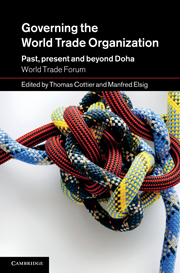Book contents
- Frontmatter
- Contents
- List of figures
- List of tables
- Notes on Contributors
- Preface
- List of abbreviations
- 1 Introduction
- PART I Setting the stage
- 2 The origins and back to the future: a conversation with Ambassador Julio Lacarte Muró
- 3 After globalisation? WTO reform and the new global political economy
- PART II Boundaries
- PART III Emerging and established powers
- PART IV Weaker actors
- PART V The consensus principle
- PART VI Quo vadis?
- Index
- References
3 - After globalisation? WTO reform and the new global political economy
Published online by Cambridge University Press: 07 September 2011
- Frontmatter
- Contents
- List of figures
- List of tables
- Notes on Contributors
- Preface
- List of abbreviations
- 1 Introduction
- PART I Setting the stage
- 2 The origins and back to the future: a conversation with Ambassador Julio Lacarte Muró
- 3 After globalisation? WTO reform and the new global political economy
- PART II Boundaries
- PART III Emerging and established powers
- PART IV Weaker actors
- PART V The consensus principle
- PART VI Quo vadis?
- Index
- References
Summary
Introduction
More than a decade on from the dramatic Battle for Seattle and, in sharp contrast to its founding hubris, the World Trade Organization (WTO) confronts an existential crisis. While for many years ardent critics have actively campaigned for the WTO's demise, such voices have been increasingly displaced by the warnings of equally ardent advocates concerned as to its very survival. In a media briefing following the 2005 Hong Kong Ministerial, Pascal Lamy commented: ‘we are in a crisis’. More recently, amplifying such concerns, the Council on Foreign Relations hosted a seminar with the provocative title ‘The Future of the WTO’, while in the wake of the repeated failures to resuscitate the Doha Round many have questioned not only ‘the future of the WTO as a forum for trade liberalisation’ but have also conjectured on the ‘danger that the organization could collapse’ (Baldwin 2006; Irwin and Mavroidis 2008).
Obituaries for the WTO are undoubtedly premature but the widespread conviction that, without substantive reform, it will become increasingly marginalised has acquired a strong hold on a broad swathe of elite and academic opinion. Deadlock in the Doha Round, the rise of plurilaterals, forum shifting and institutional bypassing through expanding preferential trade agreements (PTAs), rising protectionist sentiments, and the ineffectiveness of the WTO throughout the financial crash have contributed to a widespread perception of organic crisis: declining legitimacy conjoined with an eroding sense of purpose and efficacy.
- Type
- Chapter
- Information
- Governing the World Trade OrganizationPast, Present and Beyond Doha, pp. 20 - 46Publisher: Cambridge University PressPrint publication year: 2011
References
- 3
- Cited by

